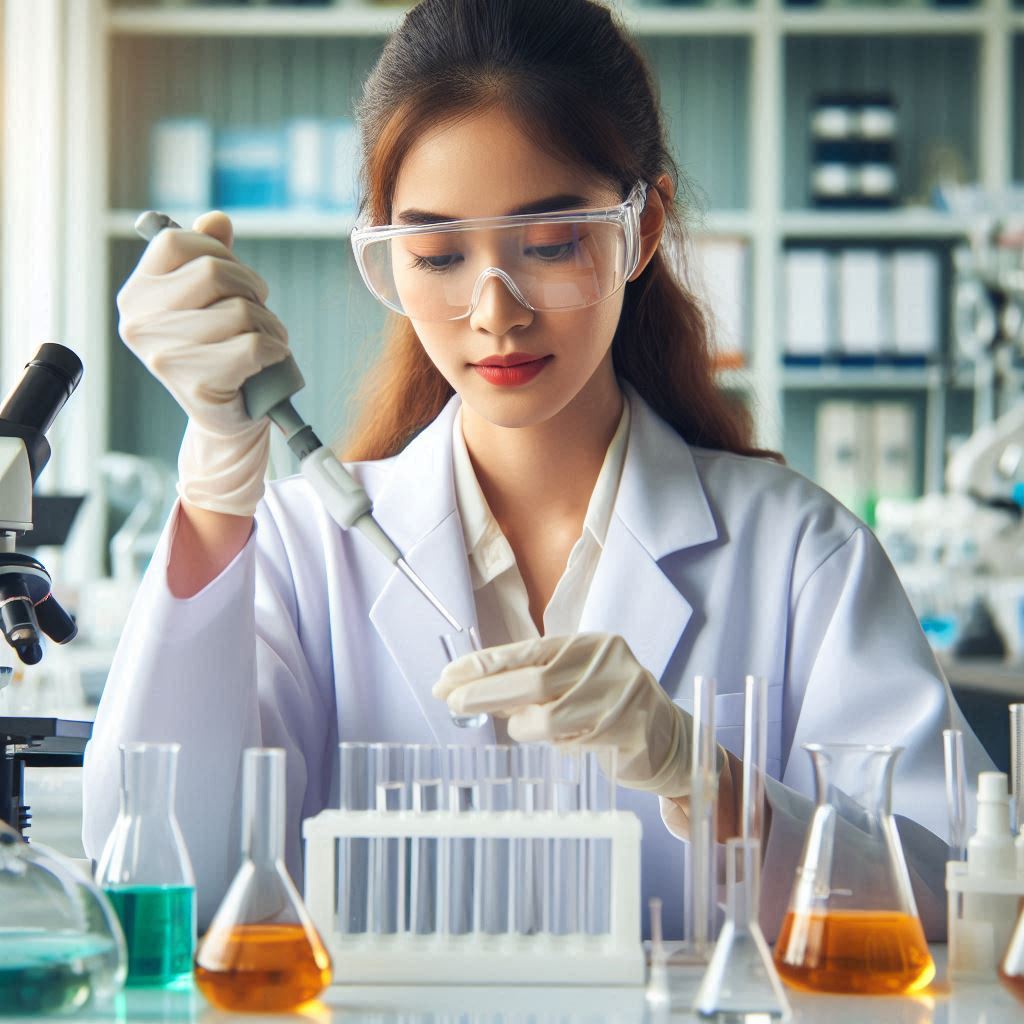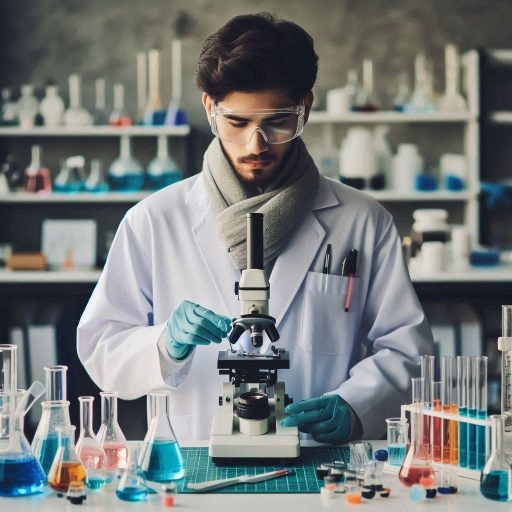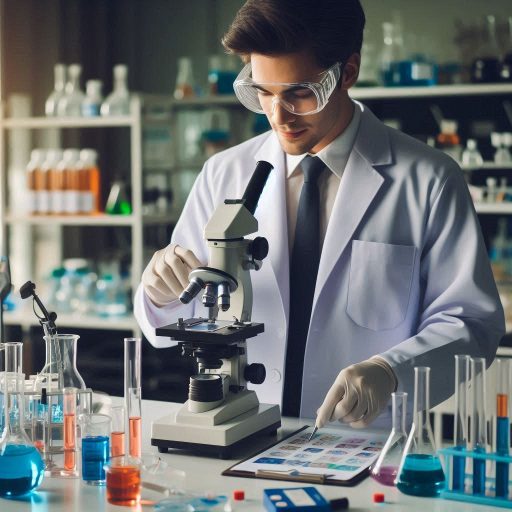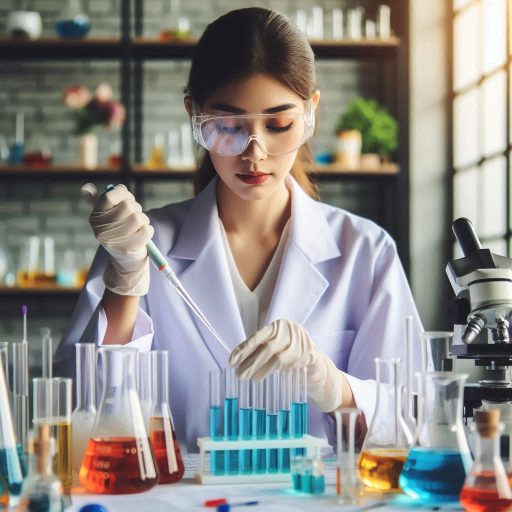Introduction
Laboratory technicians play a crucial role in conducting experiments, analyzing data, and maintaining lab equipment.
With the advancement of technology, their tasks and responsibilities have significantly transformed.
Impact of Automation
Automation in laboratories has streamlined processes like sample preparation and testing, increasing efficiency and accuracy.
Laboratory technicians now spend less time on repetitive tasks and more on data analysis.
Use of Robotics
Robotic technology has revolutionized the way laboratory technicians handle delicate or hazardous materials.
It has enhanced safety measures and minimized human error in lab procedures.
Integrated Lab Software
Laboratory technicians now use sophisticated software to manage data, track samples, and streamline communication within the lab.
This ensures efficient workflow and facilitates collaboration among team members.
Remote Monitoring
Technological advancements allow laboratory technicians to remotely monitor experiments and equipment, enabling them to troubleshoot issues and make real-time adjustments when necessary.
This enhances productivity and saves time.
Data Analysis Tools
The introduction of data analysis tools has empowered laboratory technicians to interpret complex data sets more effectively.
They can now generate reports and draw conclusions with greater accuracy, aiding in research and development efforts.
In summary, technology has revolutionized the role of laboratory technicians, making their work more efficient, accurate, and productive.
Embracing these advancements is essential for staying competitive in the ever-evolving field of scientific research.
Historical perspective of laboratory technology
Technology has played a significant role in shaping the field of laboratory technology over the years.
The evolution of technology in laboratory settings has revolutionized the way laboratory technicians carry out their work.
From simple tools and instruments to complex automated systems, technology has transformed the way labs operate.
Evolution of technology in laboratory settings
From the early days of manual techniques and basic equipment, laboratories have come a long way in terms of technological advancements.
The introduction of computer-based systems, robotic automation, and advanced analytical instruments has greatly improved the efficiency and accuracy of laboratory processes.
Laboratory technicians now have access to a wide range of sophisticated tools and equipment that allow them to perform complex experiments and analyses with precision and speed.
These technological advancements have not only streamlined laboratory workflows but have also opened up new possibilities for scientific research and discovery.
Impact of technological advancements on the role of laboratory technicians
The integration of technology into laboratory settings has had a profound impact on the role of laboratory technicians.
With automation and digitalization becoming increasingly commonplace, technicians are now required to have a strong background in technology and data analysis.
Laboratory technicians today are expected to operate and maintain advanced instruments, troubleshoot technical issues, and interpret complex data generated by automated systems.
They must also be able to adapt to new technologies and software programs as labs continue to evolve and incorporate cutting-edge tools.
Furthermore, the role of laboratory technicians has expanded to include more data management and analysis tasks, as well as collaboration with scientists and researchers to design and conduct experiments.
In this digital age, laboratory technicians are essential in ensuring the accuracy and reliability of scientific data generated in labs.
In review, the impact of technology on laboratory technicians has been profound, leading to a transformation in the way labs operate and the role of technicians within them.
As technology continues to advance, laboratory technicians will need to continuously update their skills and knowledge to keep up with the latest tools and techniques in the field of laboratory technology.
Automation in laboratories
Introduction of Automated Systems in Laboratories
In recent years, laboratories have seen a significant shift with the introduction of automated systems.
Automated systems include robotic devices, computer-controlled machines, and advanced analytical instruments.
These systems handle repetitive tasks, streamline workflows, and reduce human error.
Automation often begins with sample handling and extends to data analysis and reporting.
The adoption of automation aims to increase efficiency and consistency in laboratory operations.
For instance, automated liquid handling systems manage high-throughput assays with precision.
Similarly, automated analyzers perform complex tests faster and more accurately than manual methods.
The integration of automation enhances the capacity of laboratories to process large volumes of samples.
It also minimizes manual intervention, allowing technicians to focus on more complex tasks.
As automation technology evolves, laboratories benefit from improved accuracy and reduced operational costs.
Effects of Automation on the Work of Laboratory Technicians
Automation has profoundly impacted the daily responsibilities of laboratory technicians.
One major effect is the reduction in manual labor.
Technicians now oversee automated processes rather than performing repetitive tasks themselves.
This shift allows them to focus on interpreting results and troubleshooting issues.
Automation also enhances accuracy by reducing human error in data handling and sample analysis.
However, it requires technicians to develop new skills to manage and maintain automated systems.
Technicians must now understand programming and operation of sophisticated equipment.
They also need to stay updated with technological advancements to keep systems running efficiently.
While automation improves productivity, it introduces new challenges.
Technicians must adapt to changes in workflow and maintain a balance between automated and manual processes.
The shift towards automation also emphasizes the importance of continuous training.
Technicians must be proficient in both traditional laboratory techniques and modern automated systems.
Overall, automation transforms laboratory work by increasing efficiency and precision while requiring technicians to embrace new technologies and adapt their skills.
Read: Online Courses for Surveying and Mapping Technicians
Increased efficiency and accuracy
One of the most significant impacts of technology on laboratory technicians is the increased efficiency and accuracy in their work.
Here are some key points highlighting this improvement:
How technology has improved efficiency and accuracy in laboratory work
Technology has revolutionized laboratory processes by automating repetitive tasks, such as sample preparation and analysis.
This has reduced the time spent on manual labor, allowing technicians to focus on more critical aspects of their work.
Enhanced accuracy with digital tools
Digital tools like precision instruments and software programs have greatly enhanced the accuracy of laboratory results.
These tools provide precise measurements and calculations that minimize human error and ensure reliable data outcomes.
Streamlined data management
Technology has also simplified data management in laboratories.
Electronic databases and cloud storage systems enable technicians to store, organize, and access information quickly and securely.
This streamlines the workflow and ensures data integrity.
Real-time monitoring and analysis
Modern laboratory equipment is equipped with sensors and monitoring devices that allow real-time tracking of experiments and analysis.
This real-time feedback enables technicians to make immediate adjustments and optimize the outcomes of their experiments.
The role of laboratory technicians in utilizing technology for better results
Laboratory technicians play a crucial role in harnessing the power of technology to achieve better results.
Here are some ways in which technicians can maximize the benefits of technology in their work:
Continuous training and skill development
It is essential for laboratory technicians to undergo regular training on the latest technological advancements in their field.
By staying updated on new tools and techniques, technicians can leverage technology effectively to improve their efficiency and accuracy.
Collaboration with IT professionals
Collaborating with IT professionals can help laboratory technicians optimize the use of technology in their work.
IT experts can provide valuable insights and support in implementing and troubleshooting technological systems, ensuring smooth operation in the laboratory.
Transform Your Career Today
Unlock a personalized career strategy that drives real results. Get tailored advice and a roadmap designed just for you.
Start NowAdopting a proactive approach to technology integration
Instead of being passive users of technology, laboratory technicians should actively seek opportunities to integrate new tools into their workflows.
By experimenting with different technologies and exploring their capabilities,
technicians can discover innovative ways to enhance their work processes.
Regular maintenance and calibration of equipment
Proper maintenance and calibration of technological equipment are essential to ensure accurate and reliable results in the laboratory.
Technicians should follow manufacturer guidelines for upkeep and calibration to prevent malfunctions and maintain the equipment’s accuracy.
Overall, technology has brought about a paradigm shift in the way laboratory technicians work.
By embracing new tools and techniques, technicians can achieve higher levels of efficiency and accuracy in their laboratory tasks, ultimately advancing scientific research and innovation.
Read: CAD Technician Salary: What to Expect in the USA
Training and skill development
The need for continuous training and upskilling for laboratory technicians
Laboratory technicians play a crucial role in conducting various tests, experiments, and analyses in a laboratory setting.
With the rapid advancements in technology, the job requirements and skill sets for these technicians have evolved over time.
It is essential for laboratory technicians to undergo continuous training and upskilling to stay updated and proficient in their roles.
Importance of Continuous Training
As technology continues to progress, laboratory equipment and processes become more sophisticated and complex.
Laboratory technicians need to be well-versed in using the latest tools and technologies to ensure accurate results and efficient workflow.
Continuous training helps them adapt to these changes and enhance their skills accordingly.
Keeping Up with Industry Standards
In the field of laboratory work, adherence to industry standards and best practices is vital for ensuring the quality and reliability of test results.
Training programs provide laboratory technicians with updated information on regulatory requirements, safety protocols, and quality control measures.
By staying informed and compliant, technicians can contribute to the overall success of the laboratory.
How technology has changed the skills required for laboratory work
Technology has significantly impacted the skills required for laboratory technicians.
They are now expected to have a diverse set of technical and soft skills to effectively perform their duties in today’s high-tech laboratory environments.
Technical Skills
Laboratory technicians must be proficient in operating various types of laboratory equipment, such as spectrophotometers, chromatographs, and microscopes.
They need to understand the principles behind these instruments and interpret the data they generate accurately.
Additionally, knowledge of data analysis software and laboratory information management systems (LIMS) is essential for data organization and reporting.
Problem-Solving Abilities
As laboratories increasingly rely on automation and digital technologies, technicians are required to troubleshoot technical issues, optimize processes, and ensure the reliability of test results.
Critical thinking and problem-solving skills are essential for identifying and resolving challenges that may arise during experiments or data analysis.
Communication and Collaboration
Effective communication skills are necessary for laboratory technicians to convey findings, observations, and experimental results to their colleagues, supervisors, and external stakeholders.
Collaborating with other team members, such as scientists, researchers, and engineers, is common in laboratory settings.
Technicians must be able to work collaboratively, share information, and contribute to a team’s success.
Adaptability and Flexibility
Given the fast-paced nature of technological advancements, laboratory technicians need to be adaptable and open to learning new skills.
They should be willing to embrace change, experiment with innovative tools and methodologies, and continuously improve their capabilities to meet the demands of modern laboratory practices.
In general, the impact of technology on laboratory technicians has necessitated a shift in the skills required for laboratory work.
Continuous training and upskilling are crucial for technicians to stay relevant and proficient in their roles.
By acquiring technical expertise, problem-solving abilities, communication skills, and adaptability, laboratory technicians can excel in their positions and contribute to the advancement of scientific research and discovery.
Read: Top CAD Software for Aspiring CAD Technicians

Communication and Collaboration
Use of Technology for Improved Communication Among Laboratory Staff
Technology has revolutionized communication within laboratory settings.
Digital tools streamline interactions between laboratory staff, enhancing efficiency and coordination.
Laboratory information management systems (LIMS) facilitate real-time data sharing.
These systems ensure that technicians access updated information instantly, reducing the chances of errors.
Messaging platforms and internal communication networks also play a crucial role.
They allow technicians to share results and discuss procedures quickly.
Video conferencing tools help bridge gaps when team members cannot meet in person.
This constant and seamless communication ensures that everyone is on the same page.
Integration of electronic lab notebooks further supports communication.
Technicians can document findings and share notes digitally, making data retrieval easier.
This eliminates the need for physical paperwork and reduces the time spent searching for information.
Cloud-based solutions enable access to data from any location, promoting remote collaboration.
This is especially useful in multi-site laboratories where teams work across different locations.
Enhanced communication tools lead to faster decision-making and improved problem-solving within the lab.
Additionally, technology aids in scheduling and task management.
Shared calendars and automated reminders keep track of deadlines and appointments.
This helps prevent overlap and ensures that all necessary tasks are completed on time.
Overall, the adoption of technology in communication significantly boosts the efficiency of laboratory operations.
Collaboration with Other Healthcare Professionals Through Technology
Technology has also transformed how laboratory technicians collaborate with other healthcare professionals.
Electronic health records (EHRs) provide a comprehensive view of patient information.
Technicians can easily access and review relevant data, improving the accuracy of test results.
This integration facilitates better-informed decisions and personalized patient care.
Telemedicine platforms enhance collaboration by allowing real-time consultations with doctors and specialists.
Technicians can discuss complex cases and obtain expert opinions without the need for physical meetings.
This remote interaction speeds up diagnostic processes and improves patient outcomes.
Laboratory information systems integrate with broader healthcare networks, ensuring that test results are communicated efficiently.
Automated alerts and notifications keep healthcare providers informed of critical results immediately.
This timely information exchange supports swift medical interventions when necessary.
Moreover, collaborative software tools help manage and coordinate joint research projects.
These tools enable multiple professionals to work together on experiments and share findings instantly.
This collaborative approach accelerates research and fosters innovation in medical science.
In essence, technology significantly enhances communication and collaboration for laboratory technicians.
Improved communication tools streamline internal processes, while technology facilitates effective collaboration with other healthcare professionals.
The integration of these technologies leads to more efficient operations and better patient care.
Read: How to Become a CAD Technician: Step-by-Step Guide
Data management and analysis
Importance of data management in laboratory settings
In laboratory settings, data management is crucial for maintaining accurate records of experiments, samples, and results.
Proper data management ensures traceability, reproducibility, and compliance with regulations.
As laboratory technicians, it is essential to have organized and secure data management systems in place.
This can include electronic databases, sample tracking software, and document management systems.
By maintaining accurate records, technicians can streamline workflows, reduce errors, and make informed decisions based on reliable data.
Effective data management also promotes collaboration among team members by providing a centralized platform for sharing information.
This can improve communication, enhance productivity, and facilitate knowledge transfer within the laboratory.
How technology has revolutionized data analysis and reporting for laboratory technicians
Advancements in technology have transformed the way laboratory technicians analyze and report data.
Automation tools, such as laboratory information management systems (LIMS) and data analysis software, have streamlined processes and increased efficiency in data management.
LIMS allow technicians to input and track sample information, manage workflows, and generate reports with ease.
These systems reduce manual errors, improve data quality, and ensure compliance with industry standards and regulations.
Data analysis software, on the other hand, enables technicians to visualize and interpret data more effectively.
Features like data visualization, statistical analysis, and predictive modeling help technicians identify patterns, trends, and key insights from complex datasets.
Moreover, technology has enabled real-time data analysis, allowing technicians to make informed decisions quickly.
This rapid access to data can lead to faster experiment results, more precise conclusions, and accelerated research progress.
In review, technology has revolutionized data management and analysis for laboratory technicians, making their work more efficient, accurate, and productive.
Embracing these technological advancements is essential for staying competitive in today’s fast-paced scientific environment.
Learn More: Wind Turbine Technician Apprenticeship Insights
Explore Further: How to Become a Biomedical Engineer
Showcase Your Business Today
Reach thousands of readers actively exploring professional services. Publish your business profile and grow your audience now.
Publish NowChallenges of technology adoption
When it comes to incorporating new technologies into laboratory workflows, there are several challenges that laboratory technicians may encounter.
These challenges can hinder the adoption of technology and impact the efficiency and effectiveness of laboratory operations.
Resistance to technology adoption in laboratory settings
One of the primary challenges faced by laboratory technicians is resistance to technology adoption.
This resistance can stem from various factors, including fear of change, lack of understanding of how new technologies work, or simply a preference for traditional methods.
Laboratory technicians may be used to performing certain tasks manually or using outdated equipment, making it difficult for them to embrace new technologies.
Additionally, some technicians may feel that technology will replace their jobs, leading to a fear of job loss.
Overcoming barriers to implementing new technologies in the lab
To successfully implement new technologies in the laboratory, it is essential to address and overcome the barriers that prevent their adoption.
Here are some strategies for overcoming these challenges:
- Training and education: Providing adequate training and education on how to use new technologies can help alleviate resistance among laboratory technicians.
Demonstrating the benefits of these technologies and how they can improve efficiency can also encourage adoption. - Engaging technicians in the process: Involving laboratory technicians in the decision-making process when selecting and implementing new technologies can increase buy-in and reduce resistance.
Technicians who feel their input is valued are more likely to embrace change. - Addressing concerns about job security: Assuring laboratory technicians that new technologies are meant to enhance their work, not replace them, can help alleviate fears about job security.
Emphasizing the ways in which technology can streamline processes and improve results can also help alleviate concerns. - Providing ongoing support: Offering continuous support and guidance as technicians adjust to using new technologies can help ensure a smooth transition.
Having IT support available to troubleshoot any technical issues can also boost confidence in using the new tools. - Monitoring and evaluation: Regularly monitoring the adoption and impact of new technologies in the laboratory can help identify any issues or areas for improvement.
Collecting feedback from technicians and making adjustments as needed can increase the success of technology implementation.
By recognizing and addressing the challenges of technology adoption in laboratory settings, laboratory technicians can effectively integrate new technologies into their workflows and reap the benefits of improved efficiency and productivity.
Uncover the Details: Challenges Faced by Engineering Technicians in 2024
You Might Also Like: Telecommunications Technician: Understanding Fiber Optics
Learn More: Tools and Equipment for Industrial Mechanics
You Might Also Like: Chemical Engineering Job Market Trends
Future outlook
Predictions for the Future Impact of Technology on Laboratory Technicians
The future of technology promises significant changes for laboratory technicians.
Advances in automation and artificial intelligence (AI) are set to revolutionize laboratory practices.
Automated systems will handle repetitive tasks, allowing technicians to focus on complex analysis.
AI will enhance diagnostic accuracy and speed, transforming how laboratories operate.
Machine learning algorithms will assist in data interpretation, providing more precise results.
Technicians will need to adapt to these advancements, learning to work alongside sophisticated technologies.
Virtual reality (VR) and augmented reality (AR) may offer immersive training environments, enhancing skills without physical constraints.
The integration of these technologies will streamline workflows and improve overall efficiency in laboratories.
Opportunities and Challenges for Laboratory Professionals in a Tech-Driven World
The evolving tech landscape presents both opportunities and challenges for laboratory professionals.
Opportunities include enhanced productivity through automation and improved diagnostic capabilities.
Technicians will have access to advanced tools that offer faster and more accurate results.
This will lead to new areas of specialization and growth within the field.
However, the reliance on technology also brings challenges.
Technicians must continuously update their skills to keep pace with technological advancements.
The complexity of new systems may require extensive training and adaptation.
Data security and privacy concerns will also increase, necessitating strict adherence to regulations.
Balancing technology with traditional skills will be crucial as laboratories evolve.
Technicians will find new roles in managing and maintaining sophisticated equipment.
They will also play a key role in developing and implementing new technologies.
Collaboration with tech developers will become more common, bridging the gap between science and technology.
This collaborative environment will drive innovation and improve laboratory practices.
As technology advances, the demand for skilled technicians who can integrate and utilize new tools will rise.
Embracing these changes will position laboratory professionals as leaders in a tech-driven world.
Uncover the Details: Day in the Life of a Geological Technician
See Related Content: How to Start Your Career as a Database Administrator
Conclusion
Technology has revolutionized the field of laboratory science.
Advanced tools and systems have transformed how laboratory technicians perform their duties.
Automation, data management systems, and new diagnostic equipment have streamlined processes, improved accuracy, and increased efficiency in labs.
Technicians now handle complex tasks with greater precision, thanks to technological advancements.
This shift enhances the quality of patient care and speeds up diagnostic processes.
Embracing technology is essential for maintaining relevance in the rapidly evolving field of laboratory science.
Recap of Key Points on the Impact of Technology on Laboratory Technicians
Technology’s impact on laboratory technicians is profound and multifaceted.
Automation has drastically reduced manual tasks, freeing technicians to focus on more critical aspects of their work.
Advanced diagnostic tools provide more accurate and faster results, which is crucial for patient care.
Data management systems facilitate better record-keeping and ease of access to information.
Technicians now work with sophisticated software that integrates various testing modalities and improves overall workflow efficiency.
These technological advancements enhance the precision of tests and support more effective diagnostic strategies.
The Importance of Adapting to Technological Changes in the Field
Adapting to technological changes is vital for laboratory technicians.
The pace of technological innovation in laboratory science is rapid, and staying updated is crucial.
Technicians must continuously learn and adapt to new tools and methods to remain effective in their roles.
Embracing new technologies can lead to improved job performance and career advancement opportunities.
Training and education in emerging technologies are essential for professional growth and maintaining high standards of laboratory practice.
The ability to adapt ensures that technicians can leverage new technologies to enhance their work and contribute to better patient outcomes.
[E-Books for Sale]
The Big Book of 500 High-Paying Jobs in America: Unlock Your Earning Potential
$19.99 • 500 High-Paying Jobs • 330 pages
Explore 500 high-paying jobs in America and learn how to boost your career, earn more, and achieve success!
See All 500 High-Paying Jobs of this E-Book
1001 Professions Without a Degree: High-Paying American Jobs You Can Start Now
$19.99 • 1001 Professions Without a Degree • 174 pages
Discover 1001 high-paying jobs without a degree! Unlock career tips, skills, and success strategies for just $19.99!




